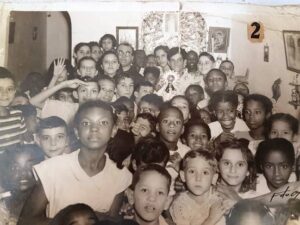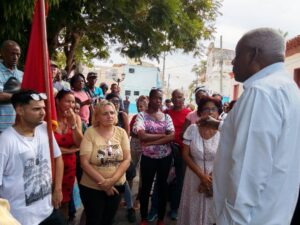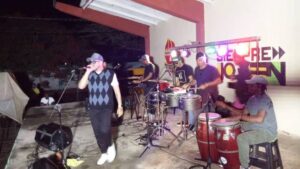The tenth in Poetry Wednesday.


The Poetry Wednesday, sponsored by the Casa de las Letras Digdora Alonso and the UNEAC, conducted by Alfredo Zaldívar, is a regular, historic space that connects with our poetic tradition and to which many of the most important figures of Cuban poetry have been invited.
The one on June 19th was dedicated to the tenth and I went there under the overwhelming sun, wearing an Oaxacan hat, which protected me and paid homage to my «guamacareña» heritage and to the hats -although this one was Mexican- of my uncle Sabino Febles, who was also an improviser, like my uncle Pedro. In a way, it was a little bit Francisco de la Cal and also, a way to change the «look» and protect myself from the sun.
There were not so many people, actually there were very few, but what seemed to be not going to be spectacular, became an unforgettable space for reading, exchange and debate.
The first thing that changed was that the conductor was no longer Zaldívar, it was Daniel Bermúdez, poet and director of Ediciones Aldabón and great connoisseur of the tenth, cultivator of the spinel, which he demonstrated with a closing dedicated to Juan Francisco Manzano, the slave poet, intertextual, moving, mixture of tradition and contemporaneity, where he was his relationship of authentic espirituano and enlightened matancero, with one of the stories of a city, which captivates and upsets.
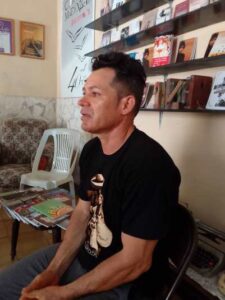
The second thing is that there was no guest poet, but an invitation to read décimas, to talk about the décima, and Daniel’s leadership was vital, because of his knowledge of the spinel and because Ediciones Aldabón sponsors a décima workshop, which I believe will be memorable and that in some way its results were visible in Poetry Wednesday.
We could say that there were four guest poets: Daniel himself, Maylan Álvarez, Cecilia Soto and Fara Madrigal, the actress and leader of Teatro Tentempié, who read or said from memory some of her humorous décimas, extracted from the daily life of our vernacular tradition, a décima that drinks from the anecdotes and popular wit, from lived experiences, with characters of the cultural reality.
Maylan demonstrated how visceral is the strength of his poetry, which extracts from reality a beauty born from the everyday, from the testimonial. The beauty and novelty of her reading, which is also a result of the aforementioned workshop of the décima, was that she turned her own poems into décimas, in a parallel reading of free verse poems transformed into spinels. And the result of the contrast, of the dialogue between forms, between ways of transmitting an idea and sensations, of constructing with new expressive resources, was one of the best moments of the afternoon.
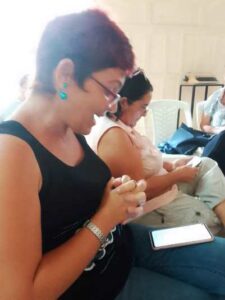
On the other hand, and this was also memorable, Cecilia Soto read her humorous tenths, which are part of an aspect of her creation and also -at least the ones read- the result of the workshop. These coincidences point to the positive aspects of the workshop.
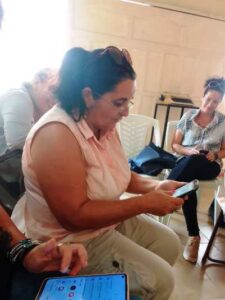
The poet demonstrated her mastery of the spinel, her ability to transmute the everyday, a simple story and tell it in verse, in images, with grace, making use of comic resources, where the play on words was essential, a feature of the playfulness of her décimas, which as announced will be published in an upcoming issue of the magazine Matanzas, another achievement of the workshop.
Texts by others were also read, especially by Alexis Díaz Pimienta, who for several reasons that sparked the debate on the décima, was the most talked about author, for his unique contribution to the written and oral spinel, for his poetic books, which offer a contemporary perspective, novel, in addition to his contributions to the theory and practice. It is significant to point out his workshops on décima, the significance for the history of Cuban culture of his book Teoría de la Improvisación poética with several editions, which constitutes a log book.
In the space, which became an intense debate, in addition to having a sample of several books on the décima or decimistas, «on consignment», a concept of which I asked its meaning, and it is nothing more than books that certain people give to sell to bookstores, with a percentage for both, it was possible to see, discuss and read a fairly large spectrum of the décima, from individual authors or anthologies.
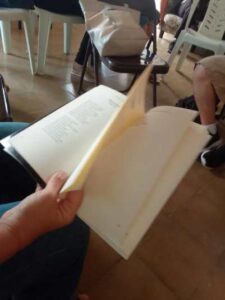
Constant reference was the Garcia family, in which each of its members was remembered, and especially Fernandito Garcia, radio and television producer, promoter, researcher and poet, for his contributions to the history of the tenth, with his book published by Ediciones Matanzas, La brevedad de lo eterno. La décima en Matanzas de 1729 a 2009, the most accurate compilation on the written and improvised spinel.
The Palmas y Cañas program, the voices of several generations of decimists in Matanzas and in Cuba, the Casa Naborí and the pause in its programming, for a 2023 affected in all the areas of the culture by essential aspects of the economy.
What seemed a slow, normal afternoon, nothing transcendent, became a space illuminated by testimonies, verses, confrontation, promotion of authors and books that mark a transcendent path in the history of the Cuban decima, which moves in the traditional and the rupture in all aspects, the aesthetic, but also that of communication, with a new receiver.
Poetry Wednesday, although simple, humble, too intimate, reminded me of the tradition of gatherings in the city of Matanzas. That vocation of meeting, of confrontation and artistic sensitivity that unites us and makes us meet again to talk about art or, as on this occasion, about the Cuban tenth.
written by Ulises rodríguez Febles.


